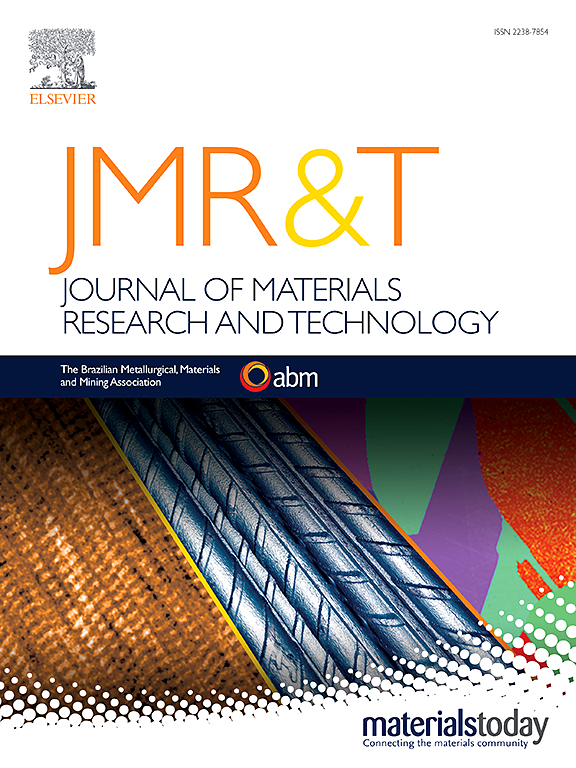Flash sintering in metallic ceramics: finite element analysis of thermal runaway in tungsten carbide green bodies
IF 6.6
2区 材料科学
Q1 MATERIALS SCIENCE, MULTIDISCIPLINARY
Journal of Materials Research and Technology-Jmr&t
Pub Date : 2023-03-01
DOI:10.1016/j.jmrt.2023.02.213
引用次数: 0
Abstract
Flash sintering is a powerful tool for the ultrarapid consolidation of green ceramic compacts, although its activation mechanisms in electrically conductive PTC (Positive Temperature Coefficient for resistivity) materials' is poorly understood. It was argued that a flash event could be initiated and sustained for a transitory period in certain PTC ceramics because of an initial negative dependence of the green material resistivity with temperature. The thermal runaway phenomenon and its activation conditions on binderless tungsten carbide (WC) green bodies are investigated in the present work by numerical simulations using finite element methods (FEM). The flash event is recreated and studied within the COMSOL Multiphysics software at the macroscale, i.e., considering the flash as an electrical power surge driven by an increasing sample's conductivity. During the flash, very high temperatures in the range of 1800–2000 °C can be reached in the WC green sample in a few seconds. The accurate numerical simulation of such event results in heating rates exceeding 1000 °C/s, a condition that theoretically brings a powder compact at temperatures high enough to accelerate and prioritize sintering densifying mechanisms over non-densifying ones. Therefore, the sample's regions where the maximum sintering temperature is reached more slowly because of thermal contacts with the electrodes remain highly porous at the end of the process.金属陶瓷的闪烧:碳化钨绿体热失控的有限元分析
闪蒸烧结是绿色陶瓷材料超快速固化的有力工具,尽管其在导电PTC(电阻率正温度系数)材料中的激活机制尚不清楚。本文认为,在某些PTC陶瓷中,由于绿色材料的电阻率最初与温度呈负相关,因此可以引发并持续一段时间的闪光事件。本文采用有限元方法对无粘结碳化钨(WC)绿体的热失控现象及其激活条件进行了数值模拟研究。在COMSOL Multiphysics软件中,在宏观尺度上重新创建并研究了闪变事件,即将闪变视为由样品电导率增加驱动的电涌。在闪蒸过程中,WC绿色样品可在几秒钟内达到1800-2000°C的高温。这种事件的精确数值模拟导致加热速率超过1000°C/s,理论上,这种条件使粉末在足够高的温度下致密化,以加速烧结致密化机制,优先于非致密化机制。因此,由于与电极的热接触,样品的最高烧结温度达到较慢的区域在过程结束时仍然是高度多孔的。
本文章由计算机程序翻译,如有差异,请以英文原文为准。
求助全文
约1分钟内获得全文
求助全文
来源期刊

Journal of Materials Research and Technology-Jmr&t
Materials Science-Metals and Alloys
CiteScore
8.80
自引率
9.40%
发文量
1877
审稿时长
35 days
期刊介绍:
The Journal of Materials Research and Technology is a publication of ABM - Brazilian Metallurgical, Materials and Mining Association - and publishes four issues per year also with a free version online (www.jmrt.com.br). The journal provides an international medium for the publication of theoretical and experimental studies related to Metallurgy, Materials and Minerals research and technology. Appropriate submissions to the Journal of Materials Research and Technology should include scientific and/or engineering factors which affect processes and products in the Metallurgy, Materials and Mining areas.
 求助内容:
求助内容: 应助结果提醒方式:
应助结果提醒方式:


